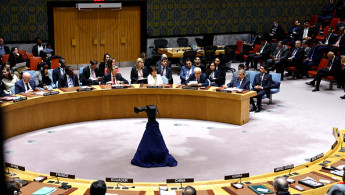World leaders to meet at UN amid threat of spillovers from war on Gaza
Over 130 world leaders will meet at the United Nations next week, faced with wars in the Middle East and Europe threatening to spread, frustration at the slow pace of efforts to end those conflicts, and worsening climate and humanitarian crises.
While the war on Gaza and Russia's war in Ukraine is set to dominate the annual high-level UN General Assembly, diplomats and analysts say they don't expect progress toward peace.
"The wars in Gaza, Ukraine and Sudan are going to be the three main crisis-points in focus at the General Assembly. I don't think we are likely to see breakthroughs on any of them," said Richard Gowan, UN director at the International Crisis Group.
UN Secretary-General Antonio Guterres last week told Reuters that the wars in Gaza and Ukraine were "stuck with no peaceful solutions in sight".
Concerns about a spillover of the war on Gaza to the broader Middle East have again escalated after Israel attacked Lebanese group Hezbollah, where pagers and hand-held radios were detonated in two days of deadly attacks. Israel has not commented on the attack.
"There is a serious risk of a dramatic escalation in Lebanon, and everything must be done to avoid that escalation," Guterres told reporters on Wednesday.
The war on besieged Gaza started two weeks after world leaders finished their annual gathering last year.
Mediation efforts by the United States, Egypt and Qatar have yet to broker a ceasefire and global patience has waned nine months after the UN General Assembly overwhelmingly demanded a humanitarian truce and as the Gaza death toll reached 41,000.
Israeli Prime Minister Benjamin Netanyahu – who has long accused the UN of being anti-Israel - and Palestinian President Mahmoud Abbas are both scheduled to address the General Assembly on 26 September.
Diplomatic speed-dating
The annual gathering of world leaders to mark the beginning of each new session of the General Assembly is often referred to as diplomatic speed-dating.
While the event is anchored by six days of leaders' speeches to the assembly, much of the action happens on the sidelines, with hundreds of bilateral meetings and dozens of side events seeking to focus the global spotlight on the main issues.
Also looming this year is the prospect of a new US administration, Republican Donald Trump, who cut UN funding and called the global body weak and incompetent while in office from 2017 to 2021, facing Democratic Vice President Kamala Harris in the 5 November election.
"Clearly in the back of everyone's mind is going to be a guy called Donald Trump," Gowan said. "I think in a lot of the private conversations around the General Assembly ... the number one question will be what will Trump do to the organization."
This year, side events will be held on the war and humanitarian crisis in Sudan, where famine has taken hold, international efforts to help Haiti fight gang violence and the Taliban crackdown on women's rights in Afghanistan.
Guterres poked fun at himself on Wednesday, saying he has "no power and no money."
"There are two things the Secretary-General of the United Nations has, and I have to say that I've been using them," he told reporters. "One is my voice, and nobody will be able to shut it up. And second is the capacity to convene people of goodwill to address and solve problems."
Iran, Ukraine
Western accusations about Iran's role in the Middle East - Hamas, Hezbollah and Yemen's Houthis are aligned with Tehran - and support for Russia's war in Ukraine also shadow this year's UN General Assembly.
European powers seek to revive efforts to rein in Iran's nuclear program, and Iranian and European officials are due to meet in New York next week to test their mutual willingness to engage.
Iran's comparatively moderate new president, Masoud Pezeshkian, will address the United Nations on Tuesday.
Pezeshkian "will focus on detente, building confidence with the world, and de-escalation," a senior Iranian official said, but he will also "stress Iran's right to retaliate" against Israel if needed.
Ukrainian President Volodymyr Zelenskiy will address the high-level General Assembly gathering for the third time since Russia invaded his country. He is due to address a meeting on Ukraine of the 15-member Security Council on Tuesday and the General Assembly on Wednesday.
Zelenskiy plans to push Russia to diplomatically end the war and present it to US President Joe Biden this month. He also wants to share it with both Biden's potential successors, Harris and Trump.
Some US officials have already been briefed on elements of the plan.
"We think it lays out a strategy and a plan that can work. And we need to see how we can promote that as we engage with all of the countries' heads of state who will be here in New York ... we do have hope to make some progress," US Ambassador to the UN Linda Thomas-Greenfield told reporters on Tuesday.
While Russian President Vladimir Putin virtually addressed the General Assembly in 2020 during the COVID-19 pandemic, he has not physically travelled to New York for the event since 2015.
Russian Foreign Minister Sergei Lavrov is instead due to speak to the General Assembly on 28 September.
(Reuters)




 Follow the Middle East's top stories in English at The New Arab on Google News
Follow the Middle East's top stories in English at The New Arab on Google News
![A group of Palestinians, foreign and Israeli activists gather to participated in an olive picking event on the land in the town of Battir, which is under threat of confiscation by Israel in Bethlehem, occupied West Bank on 8 November 2024. [Getty]](/sites/default/files/styles/image_330x185/public/2182930803.jpeg?h=199d8c1f&itok=__0LgGsa)

![People gathered around the rubble of destroyed houses to search for survivors [Getty]](/sites/default/files/styles/image_330x185/public/2024-11/GettyImages-2184733820.jpg?h=199d8c1f&itok=NiM1LO2f)